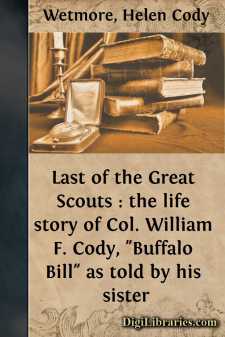Categories
- Antiques & Collectibles 13
- Architecture 36
- Art 48
- Bibles 22
- Biography & Autobiography 813
- Body, Mind & Spirit 142
- Business & Economics 28
- Children's Books 17
- Children's Fiction 14
- Computers 4
- Cooking 94
- Crafts & Hobbies 4
- Drama 346
- Education 46
- Family & Relationships 57
- Fiction 11829
- Games 19
- Gardening 17
- Health & Fitness 34
- History 1377
- House & Home 1
- Humor 147
- Juvenile Fiction 1873
- Juvenile Nonfiction 202
- Language Arts & Disciplines 88
- Law 16
- Literary Collections 686
- Literary Criticism 179
- Mathematics 13
- Medical 41
- Music 40
- Nature 179
- Non-Classifiable 1768
- Performing Arts 7
- Periodicals 1453
- Philosophy 64
- Photography 2
- Poetry 896
- Political Science 203
- Psychology 42
- Reference 154
- Religion 513
- Science 126
- Self-Help 84
- Social Science 81
- Sports & Recreation 34
- Study Aids 3
- Technology & Engineering 59
- Transportation 23
- Travel 463
- True Crime 29
Last of the Great Scouts : the life story of Col. William F. Cody, "Buffalo Bill" as told by his sister
Categories:
Description:
Excerpt
CHAPTER I. — THE OLD HOMESTEAD IN IOWA.
A PLEASANT, roomy farm-house, set in the sunlight against a background of cool, green wood and mottled meadow—this is the picture that my earliest memories frame for me. To this home my parents, Isaac and Mary Cody, had moved soon after their marriage.
The place was known as the Scott farm, and was situated in Scott County, Iowa, near the historic little town of Le Clair, where, but a few years before, a village of the Fox Indians had been located; where Black Hawk and his thousand warriors had assembled for their last war-dance; where the marquee of General Scott was erected, and the treaty with the Sacs and Foxes drawn up; and where, in obedience to the Sac chief's terms, Antoine Le Clair, the famous half-breed Indian scholar and interpreter, had built his cabin, and given to the place his name. Here, in this atmosphere of pioneer struggle and Indian warfare—in the farm-house in the dancing sunshine, with the background of wood and meadow—my brother, William Frederick Cody, was born, on the 26th day of February, 1846.
Of the good, old-fashioned sort was our family, numbering five daughters and two sons—Martha, Samuel, Julia, William, Eliza, Helen, and May. Samuel, a lad of unusual beauty of face and nature, was killed through an unhappy accident before he was yet fourteen.
He was riding "Betsy Baker," a mare well known among old settlers in Iowa as one of speed and pedigree, yet displaying at times a most malevolent temper, accompanied by Will, who, though only seven years of age, yet sat his pony with the ease and grace that distinguished the veteran rider of the future. Presently Betsy Baker became fractious, and sought to throw her rider. In vain did she rear and plunge; he kept his saddle. Then, seemingly, she gave up the fight, and Samuel cried, in boyish exultation:
"Ah, Betsy Baker, you didn't quite come it that time!"
His last words! As if she knew her rider was a careless victor off his guard, the mare reared suddenly and flung herself upon her back, crushing the daring boy beneath her.
Though to us younger children our brother Samuel was but a shadowy memory, in him had centered our parents' fondest hopes and aims. These, naturally, were transferred to the younger, now the only son, and the hope that mother, especially, held for him was strangely stimulated by the remembrance of the mystic divination of a soothsayer in the years agone. My mother was a woman of too much intelligence and force of character to nourish an average superstition; but prophecies fulfilled will temper, though they may not shake, the smiling unbelief of the most hard-headed skeptic. Mother's moderate skepticism was not proof against the strange fulfillment of one prophecy, which fell out in this wise:
To a Southern city, which my mother visited when a girl, there came a celebrated fortune-teller, and led by curiosity, my mother and my aunt one day made two of the crowd that thronged the sibyl's drawing-rooms.
Both received with laughing incredulity the prophecy that my aunt and the two children with her would be dead in a fortnight; but the dread augury was fulfilled to the letter....


